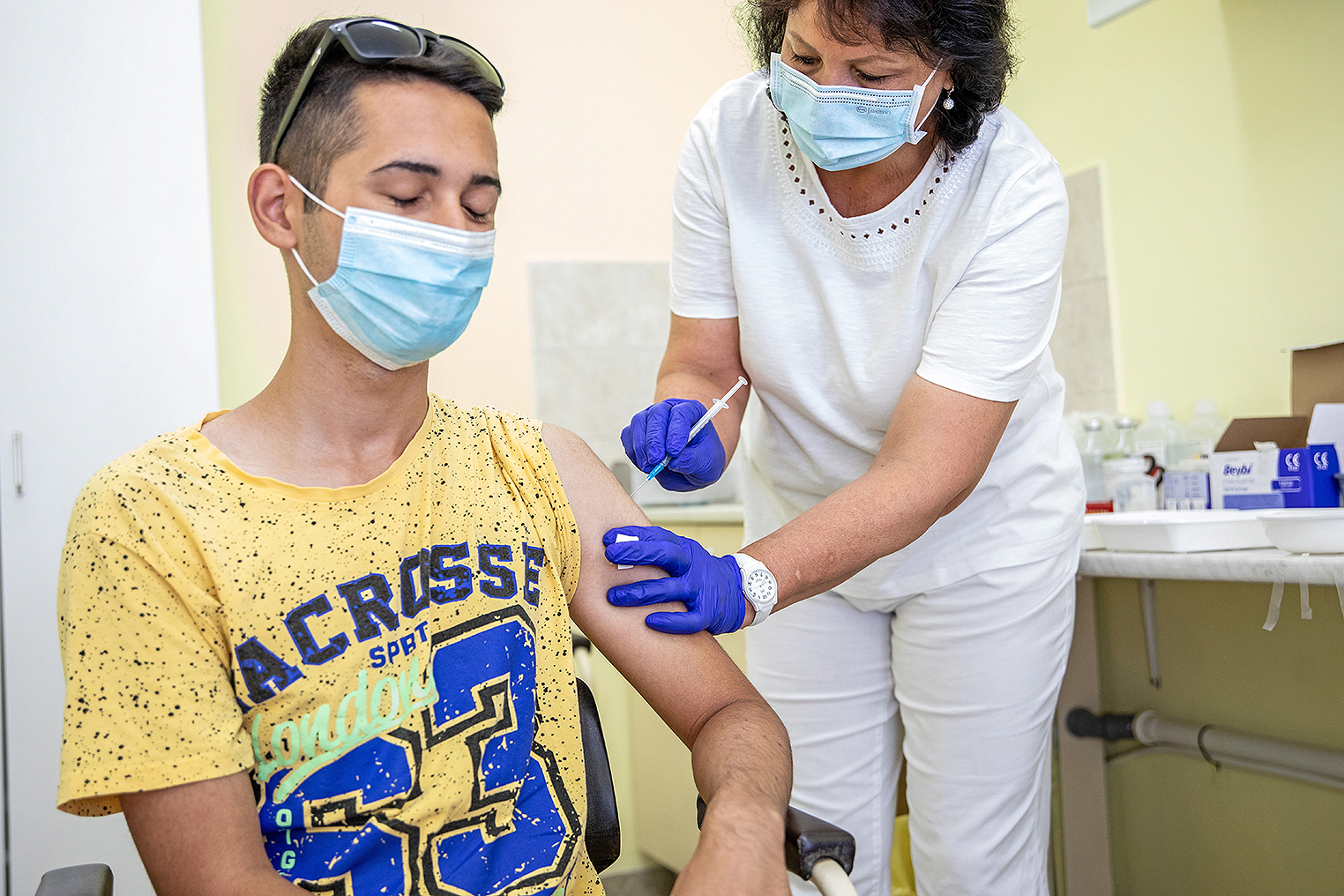Hungary Continues Relaxation of its COVID-19 Restrictions

Assistant András Pallag vaccinates a young man with the second dose of the German-American Comirnaty vaccine developed Pfizer-BioNTech, at the Pál Réthy Hospital in Békéscsaba on July 13, 2021.
Photo by MTI / Tibor Rosta.
The Hungarian government announced that the 5.5 million citizens vaccinated threshold had been passed in a post on Facebook late on July 2.
“The number of inoculated has reached 5.5 million. From Saturday [July 3], masks aren’t required,” the government said in the post.
Speaking in his weekly interview on Kossuth Rádió earlier on July 2, Prime Minister Viktor Orbán said passing the threshold would trigger a further easing of pandemic restrictions.
A decree published in the official Magyar Közlöny (Hungarian Gazette) mandated those changes to restrictions. For instance, it ends mandatory mask-wearing in businesses and public transport and area-based limits on shopper numbers.
Additionally, immunity certificates are no longer required for dining indoors, staying at hotels, or attending performances with assigned seating.
The limit on the number of people attending private gatherings was raised from 50 to 100 people, and the limit on the number of guests at wedding receptions from 200 to 400. Finally, the decree allowed for a return to lecture hall instruction at colleges and universities.
Meanwhile, as the outdoors open further to the rest of us, the indoors have opened further for others. Prisoners who have been double-dosed with vaccines are now able to receive visitors again at all penitentiary institutions across the country, according to the National Penitentiary Command (BvOP).
Prisoners can receive a visitor from the 15th day after receiving the second dose of the vaccine, provided they are asymptomatic. However, it is still mandatory to wear a face mask, maintain the required social safety distance, and avoid direct physical contact throughout visits. Visits are allowed once a month for up to 30 minutes.
Vaccine Diplomacy
As the domestic vaccination campaign plateaus past the 5.5 million threshold, the lending or donation of vaccines to regional neighbors continues.
Minister of Foreign Affairs and Trade Péter Szijjártó delivered 100,000 doses of the Pfizer/BioNTech COVID vaccine that Hungary is lending to the Czech Republic to Prime Minister Andrej Babis in Prague on July 1.
He also delivered a donation of 200,000 doses of the Sinopharm coronavirus vaccine to Sarajevo, Bosnia and Herzegovina on July 5, according to the official government coronavirus website koronavirus.gov.hu.
Szijjártó said, “If things are going well in the Western Balkans, it’s good for us. If things are going poorly in the Western Balkans, it’s bad for us.” To that end, he also donated an additional 200,000 doses of the Sinopharm coronavirus vaccine to Bosnia and Herzegovina’s neighbor, Montenegro, the same day.
Back in Hungary, an additional 260,000 doses of the Pfizer/BioNTech COVID vaccine arrived in Hungary on July 8. Pfizer Gyógyszerkereskedelmi said the latest shipment raises the total deliveries of the Comirnaty vaccine to Hungary to more than 6.3 million doses.
For those who are vaccinated, the question of immunity certificate acceptance has become less of an issue domestically. International travel is a different matter. So far, Hungary has also reached agreements on mutual recognition of domestic COVID immunity certificates with at least 19 countries, the latest being San Marino.
At the same time, Hungary has started issuing European Union digital COVID certificates on July 1. The EU COVID certificate is valid throughout the EU, but member states can still determine for themselves which types of vaccine to accept among those that have not been cleared by the European Medicines Agency (EMA).
At the time of writing, the EMA has authorized Comirnaty (Pfizer/BioNTech), COVID-19 Vaccine Janssen, Spikevax (previously COVID-19 Vaccine Moderna), and Vaxzevria (previously COVID-19 Vaccine AstraZeneca).
In other words, an EU member state may decide not to accept the Chinese and Russian vaccines Hungary has been administering among its mix of jabs.
This article was first published in the Budapest Business Journal print issue of July 16, 2021.
SUPPORT THE BUDAPEST BUSINESS JOURNAL
Producing journalism that is worthy of the name is a costly business. For 27 years, the publishers, editors and reporters of the Budapest Business Journal have striven to bring you business news that works, information that you can trust, that is factual, accurate and presented without fear or favor.
Newspaper organizations across the globe have struggled to find a business model that allows them to continue to excel, without compromising their ability to perform. Most recently, some have experimented with the idea of involving their most important stakeholders, their readers.
We would like to offer that same opportunity to our readers. We would like to invite you to help us deliver the quality business journalism you require. Hit our Support the BBJ button and you can choose the how much and how often you send us your contributions.









